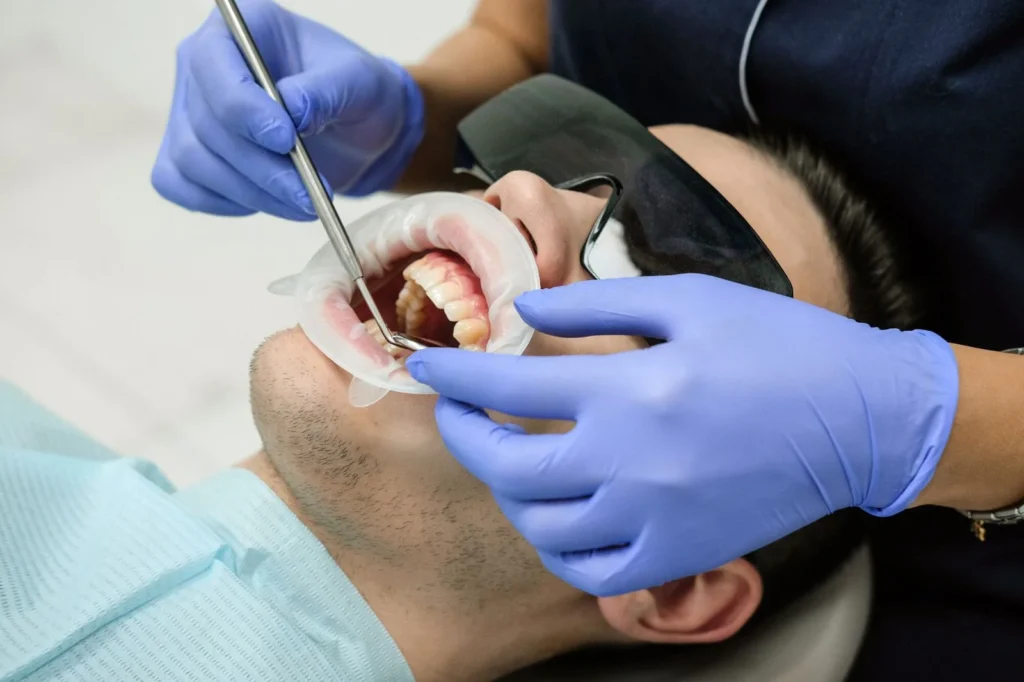Experiencing dental implant pain can be concerning and frustrating. But what causes this discomfort? Understanding the reasons behind dental implant pain is crucial.
Proper dental care can prevent many issues, but sometimes pain still occurs. This blog aims to explore the common causes of dental implant pain.
Could there be underlying issues with the implant itself? Or is it a matter of proper dental hygiene?
We’ll delve into these questions and provide clear, simple insights. Stay tuned to learn more about maintaining good dental care and addressing implant pain effectively.
Causes of Dental Implant Pain
Dental implant pain is not uncommon, and there are various reasons why it may occur. Here are some of the most common causes:
Infection
One of the leading causes of dental implant pain is infection, also known as peri-implantitis. This occurs when harmful bacteria invade the gum and bone tissue around the implant. Poor oral hygiene is a primary contributor to infections.
If food particles and plaque are not adequately cleaned away, they can lead to inflammation and infection. Symptoms of an infection include swelling, redness, and a persistent bad taste in the mouth. In severe cases, an infection can result in bone loss around the implant, causing it to become loose or fail.
Improper Healing
Another common cause of dental implant pain is improper healing. Healing issues can arise when the implant does not properly integrate with the jawbone, a process known as osseointegration. This failure can be due to various factors, including excessive movement of the implant during the healing phase, insufficient bone density, or underlying health conditions such as diabetes or osteoporosis.
Symptoms of improper healing include persistent pain, swelling, and discomfort around the implant site. Ensuring the implant remains stable and minimizing pressure on the affected area is crucial for proper healing.
Nerve Damage
Nerve damage is another potential cause of dental implant pain. This can occur if the implant is placed too close to or directly on a nerve. The inferior alveolar nerve in the lower jaw is particularly vulnerable.
Symptoms of nerve damage include sharp, severe pain, a tingling sensation, or numbness in the surrounding areas such as the lips, chin, or gums. This type of damage may happen during the surgical placement of the implant or as a result of swelling post-surgery.
Bruxism
Bruxism, or teeth grinding, is another factor that can cause dental implant pain. This condition typically occurs during sleep, often without the individual being aware.
The constant grinding and clenching place excessive stress on both the implant and the surrounding teeth and jawbone. Symptoms include jaw pain, headaches, and chipped or worn-down teeth. Bruxism can hinder the healing process of dental implants and may even lead to implant failure.
Allergic Reaction
An allergic reaction to the materials used in dental implants can also cause significant pain. Most dental implants are made from titanium or titanium alloy, which are generally biocompatible.
Yet, some individuals may have an allergic response to these metals. Symptoms of an allergic reaction include swelling, itching, redness, and even a rash at the implant site. In rare cases, patients might experience more severe reactions, such as difficulty breathing.
Sinus Issues
Sinus issues are another possible cause of dental implant pain, particularly for implants placed in the upper jaw. The roots of the upper teeth are located very close to the sinuses. When an implant is inserted in this area, there’s a risk it can protrude into the sinus cavity.
This may lead to a condition called sinusitis, where the sinus becomes inflamed. Symptoms of sinus issues include pain, pressure, congestion, and a stuffy nose. It can also cause pain around the cheeks and eyes.
Preventing Dental Implant Pain
There are steps you can take to prevent discomfort and ensure successful healing. These include:
Proper Oral Hygiene
Maintaining proper oral hygiene is essential for preventing dental implant pain and ensuring long-term success. Good oral hygiene practices remove plaque and food particles. It can prevent infections that might lead to peri-implantitis.
Brushing your teeth at least twice a day with a soft-bristle toothbrush and using non-abrasive toothpaste is crucial. Flossing daily helps reach areas that brushing alone cannot.
Using an antibacterial mouthwash can further decrease harmful bacteria levels in the mouth. These simple steps can go a long way toward maintaining dental implants and oral health.
Regular Dental Check-Ups
Regular dental check-ups are crucial when you have dental implants. These visits help monitor the condition of your implants and ensure they are healing properly.
During a check-up, the dentist will examine your mouth, teeth, and gums and may take X-rays to get a closer look. This helps in detecting any early signs of problems such as infections, improper healing, or other complications.
These check-ups also give your dentist the chance to clean hard-to-reach areas around the implants, removing any buildup of plaque or tartar. Regular appointments with your dentist can prevent minor issues from becoming major problems and ensure your dental implants last for many years. So, schedule your check-ups every six months or as recommended by your dentist.
Addressing Bruxism
Managing bruxism is vital for the health and stability of dental implants. If you grind your teeth, especially at night, it’s important to seek advice from your dentist.
One common solution is to wear a night guard, a custom-fitted plastic device that cushions your teeth and reduces the pressure from grinding. Stress management techniques such as yoga, meditation, or deep-breathing exercises can help diminish teeth grinding caused by anxiety or stress.
Regularly practicing jaw exercises can also relieve tension in the jaw muscles. Ensuring a good sleep environment-like maintaining a consistent sleep schedule and avoiding caffeine before bed-can reduce bruxism episodes.
Communicating With Your Dentist
Open and honest communication with your dentist is essential for the success of your dental implants. If you experience any dental discomfort, it’s crucial to inform your dentist immediately. This includes any pain, swelling, or unusual sensations around the implant site.
Early detection of potential issues can prevent serious complications and ensure quicker treatment. Don’t hesitate to ask questions or express any concerns you may have about your dental implants.
Your dentist is there to help and provide you with the best possible care. Clear communication ensures that you and your dentist can work together to maintain your implants.
Addressing Dental Implant Pain
If you are experiencing dental implant pain, it is important to address it promptly. Ignoring the discomfort can lead to further issues and complications. Here are some steps you can take:
Pain Relievers
If you’re feeling pain from your dental implants, over-the-counter pain relievers can provide some relief. Medications like ibuprofen or acetaminophen are commonly used to reduce pain and inflammation.
They can help make you more comfortable while the underlying issue is being addressed. Make sure to follow the dosage instructions on the packaging, and consult your dentist if you have any questions or concerns. For more severe pain, your dentist might prescribe a stronger medication.
Antibiotics
If an infection is causing your dental implant pain, your dentist may prescribe antibiotics. These medications help to kill or prevent the growth of harmful bacteria. It’s crucial to take the full course of antibiotics as directed, even if you start feeling better before the medication is finished.
Stopping antibiotics too early can allow bacteria to survive and cause the infection to come back. Common antibiotics used for dental infections include amoxicillin, clindamycin, and metronidazole. Make sure to let your dentist know if you have any allergies to medications.
Rest and Recovery
Rest and recovery are crucial when dealing with dental implant pain. Taking time to rest allows your body to heal more effectively. After your implant surgery, avoid intense physical activities like running or heavy lifting for a few days.
Instead, focus on relaxing and taking it easy. Elevating your head while sleeping can help reduce swelling and discomfort. It’s also important to stay hydrated and eat soft foods that don’t require much chewing.
This helps prevent additional stress on the implant site. By giving your body the rest it needs, you promote faster healing and reduce the risk of complications.
Seeking Professional Help
If your dental implant pain persists despite taking steps at home to manage it, it’s essential to seek professional help. Pain could be an indication of a more serious issue that needs professional treatment.
Contact your dentist to schedule an appointment. They can perform a thorough examination and determine the exact cause of your discomfort.
In severe cases where immediate attention is required, visit the nearest emergency dental clinic. These clinics are well-equipped to handle urgent dental issues and can provide you with the necessary care to ease pain and prevent further complications. Addressing dental pain early can make a significant difference in the outcome.
Learn More About the Causes of Dental Implant Pain
Understanding the causes of dental implant pain is essential. Proper care and hygiene can prevent many issues. Addressing complications early ensures better outcomes.
Regular check-ups help detect problems before they worsen. Manage bruxism to avoid implant complications. Communicate openly with your dentist about any pain.
Prompt professional help is critical for serious discomfort. Dental implant pain should never be ignored.
Following these steps promotes implant success. Your oral health is important; take care of it diligently.
Did you find this article helpful? If so, check out the rest of our site for more informative content.







